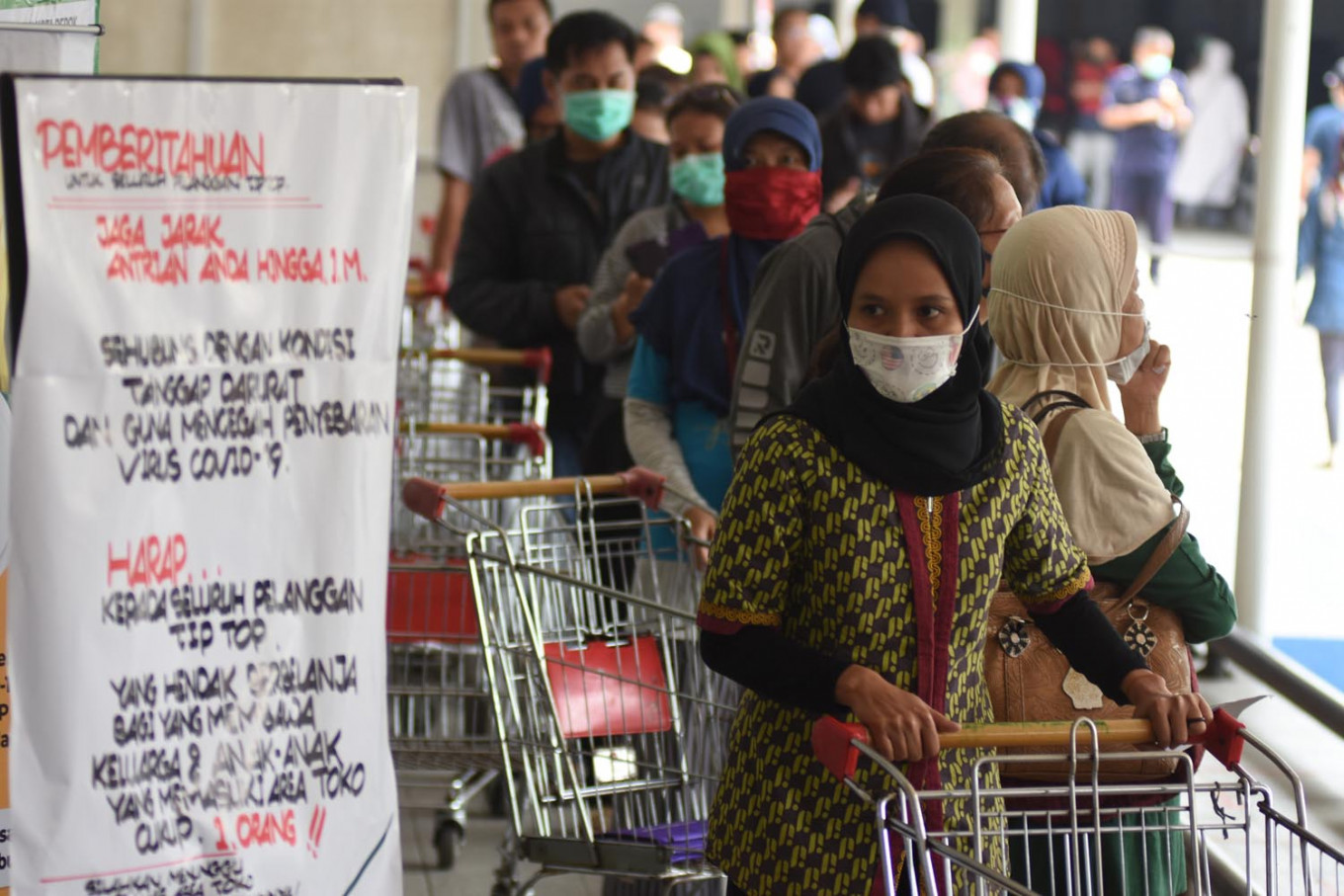Popular Reads
Top Results
Can't find what you're looking for?
View all search resultsPopular Reads
Top Results
Can't find what you're looking for?
View all search resultsCOVID-19 to slash Indonesia’s growth to 2.1% as millions may slip into poverty: World Bank
The World Bank has estimated that the COVID-19 pandemic will significantly slow Indonesia’s economic growth this year and may throw millions of people into poverty.
Change text size
Gift Premium Articles
to Anyone
The World Bank has estimated that the COVID-19 pandemic will significantly slow Indonesia’s economic growth this year and may throw millions of people into poverty.
World Bank lead economist for Indonesia Frederico Gil Sander said a precise growth forecast was difficult to make, but the baseline scenario for Indonesia’s growth was 2.1 percent in 2020, down from 5.1 percent initially projected, if the situation started to normalize by June.
“We are looking at the best scenario, where the country only needs mobility restrictions for another month and things can start normalizing by June so the recovery could start in the third quarter,” Sander told a limited teleconferenced media briefing on Tuesday.
“The downside risks, however, if the country has severe mobility restrictions even into the third quarter and [if there is] a deeper global recession, growth will surely move away from the baseline scenario.”
The bank estimated that government spending would grow by 5 percent this year, compensating for lost growth in other components as household spending growth was expected to drop to 1.5 percent, while exports and imports would contract by 2 percent and 7 percent, respectively.
Indonesia’s economy grew by 5.02 percent last year, marking a slowdown from 5.17 percent in 2018. The government has prepared for the worst, including zero growth this year, as the COVID-19 pandemic has disrupted business activity in the country.
The pneumonia-like disease has infected more than 1,400 people and killed 122 in the country as of Monday afternoon, when the government decided to impose stricter rules on social distancing, coupled with so-called civil emergency measures.
The Washington, DC-based bank expects the world economy to grow at 5.6 percent in 2021 as the outbreak subsides, according to its report East Asia and Pacific in the Time of COVID-19, published on Tuesday.
The report projects that growth in the East Asian and Pacific region could slow to 1.3 percent in the baseline scenario or the region’s economy could contract by 2.8 percent in the bear case scenario. “The pandemic is profoundly affecting the region’s economies, but the depth and duration of the shock are unusually uncertain,” the report reads.
The financial shock of the pandemic is also expected to have a serious impact on poverty, defined as a situation where an individual earns income of US$5.5 or less a day, the bank said.
More than 11 million people could fall into poverty in East Asian-Pacific countries, the bank estimates. That is in stark contrast to its earlier forecast that growth would be sufficient to lift 35 million people out of poverty this year.
Read also: Indonesia’s budget to fight COVID-19: What we know so far
Sander warned that millions of Indonesians, including those from poor families and informal-sector workers, were lacking economic security, adding that the situation would expose them to shocks caused by the outbreak.
He added that the government should look into providing health insurance for more people, helping students from poor families study online and providing financial relieve for informal workers.
“We are encouraged to see the priorities in the stimulus packages that include increasing transfers [to safety nets]; this is something the government should look at,” he said, adding that many firms in Indonesia were in need of liquidity, as business activities had been disrupted in many sectors.
So far, the government has prepared a total of Rp 158.2 trillion ($9.77 billion) in funds to finance the healthcare sector and safeguard individuals, workers and businesses affected by the COVID-19 pandemic. This includes the first and second stimulus packages worth Rp 10.3 trillion and Rp 22.9 trillion, respectively.
The government is finalizing a new state budget designed to battle the health and economic impacts of the COVID-19 pandemic, including widening the state budget deficit beyond its current legal limit of 3 percent of gross domestic product (GDP).
Editor's note: The article has been updated to revise baseline economic growth projection for Indonesia in 2020 to 2.1 percent, not 2.8 percent.










